Tools For Identifying Online Dating Scams and Liars
Published on October 16, 2009
This article is one in a series that discusses protecting yourself from scams when dating online.
As online dating grows more popular so do dating scams associated with them. There are many good resources online describing dating scams but not very many give concrete ways to defend or combat them. Because of this, I want to offer some actual methods to detect if you’re dealing with a dishonest person. I’ll try to cover the tools in detail so you can perform your own detective work if it is ever required.
Just a little warning before we begin: using some of the tools I’m going to cover can be considered a little…rude. All information discovered is publicly available but sometimes taking actions like this can be viewed as distrustful (and rightfully so). However, your safety should come first. By no means would I suggest these tools be used for every person you meet online. In a healthy relationship, you allow your partner to reveal details about themselves…you don’t go digging! However, if you ever have any suspicions at all that you are being scammed or lied to or that your safety is at risk, you should be aware of these options.
Tools to Identify an Online Dating Scammer or Liar
Protect Your Personal Email
This step won’t help you identify if you’re being lied to or scammed but it could protect you from spam or someone who is a little too interested in you. In this step, I’m going to walk you through the steps of setting up a new email account at Gmail and then setting up that account so it will forward all email received to your main email account. This way you are protected but can still receive communication in your preferred email account (although replying should be done through Gmail if you want to avoid revealing your main address).
- Browse to gmail.com and click the “Create an account” button

- You will now be required to fill in the standard sign-up information such as first and last name, a login name for you email account and so one. When selecting your login, best to select it in such a way that it doesn’t reveal anything about you. Don’t using something like “Sarah301Preston” when your name is Sarah and you live on 301 Preston Avenue! Hopefully this goes without saying!
- Once all the boxes are filled in, click “I accept and create my account”. You may then need to click on “Take me to my account”. Now you’re all set up with your new email account.
- Now that you’re in your new email account, click on the Settings link in the upper right.

- Now, click on “Forwarding and POP/IMAP”

- Select the radio button labeled “Forward a copy of incoming mail to ” and then enter your primary email address in the text box. In the example below, you would replace you@youremail.com with your actual email.

Save the settings and that’s it! You’re all set up. Now when you give out an email address when online dating, you’ll give this address. Any email sent to this address will also be forwarded to your main account so you’ll never miss a beat.
Gently Requesting for More Information
Technically this is not a tool but rather some advice when you’re looking for more information. If you’re dealing with a scammer or a liar they’ll probably find away to avoid giving you the answers you want and this is the point where you would start using the other tools we’ll discuss. If you’re becoming suspicious, ask specific questions and see how hard they work to avoid answering. Changing the subject or outright ignoring the question are not good signs. Additional methods for gaining more information aside from directly asking could include:
- If you are concerned that someone is not who they say they are or if you suspect they are lying about their appearance, suggest a webcam. Pay careful attention to how they react. Webcams are cheap and easy to use so any excuses about the webcam being broken or not being able to afford one should be viewed as suspect. Ladies, most men will buy a webcam after 7 words from you: I really want to show you something. Then when they buy the webcam show them that beautiful smile!
- If they won’t go for a webcam, ask for more photos. If they refuse or provide more photos but you are still suspicious, you may want to share your concerns with them. Let them know, in a kind way, that you want to be careful with online dating and some of their actions are causing you concern. If they are truly interested in you they will understand. If they still offer convincing excuses why they can’t provide you with more information or if you are still suspicious, look into the remaining tools.
Searching the TinEye Image Database
Tineye is a service like Google but instead of searching keywords you search with images. Using this service is actually similar to the process you go through when uploading your photo to online dating services. The main point for using this service is when you suspect photos you are being given are just visual lies. For this example we’ll assume that I’ve received an email from an attractive woman who is unbelievably interested in me. Conversations with her have been very strange and I’m starting to suspect the picture that she’s provided is not really her. Here are the steps to search the Tineye database (I’ll be using Firefox to describe some of these steps but all modern browsers will support these steps):
- Browse for the photo on your computer then click search
OR
- Right click the image you want to search and select “Copy Image Location”. You can do this directly from your online dating service.

- Now browse to Tineye.com and right-click on the search box on the right and select paste. This will paste the location of the image into the search box. Now click search.
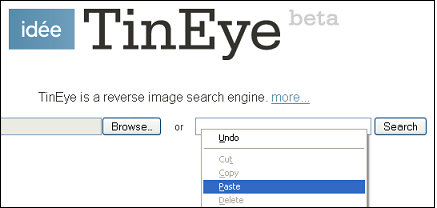
Well, look at that! It looks like Megan Fox has been contacting me all this time!
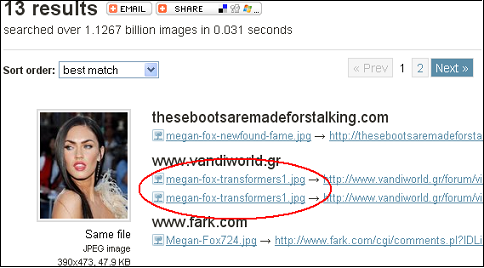
Obviously I’m being scammed here. Megan Fox is probably not the best example for this since she’s recognizable but you get the idea. If someone is grabbing pictures of models off of the internet and using them as their own this process can help you identify that. Tineye may not return any results when you do your search but in many cases that’s good. However, just because Tineye doesn’t have the photo you’re searching for in their database doesn’t mean the photo is legit! Tineye is still growing and only has a small portion of the images on the internet indexed.
Searching Pipl
Pipl is an extremely powerful and easy to use people search engine. You can search the database for people by their name and city, by their email address, by their user name and also by their phone number. The service will return information from public records, online newspapers, social sites and other areas. I’ve used this service for many different reasons and have had success with it in most cases: searching for my aunt’s phone number, looking for an old high school friend, and so on. In some ways this tool is scary (brave enough to search yourself?). Keep in mind that using this service is an intrusive thing to do and I would only recommend using it if you have serious suspicions regarding your potential date. The results of this service are self-explanatory and I’ve had luck find people with all four types of searches (including user name surprisingly enough…turns out most of us use the same user id over and over).
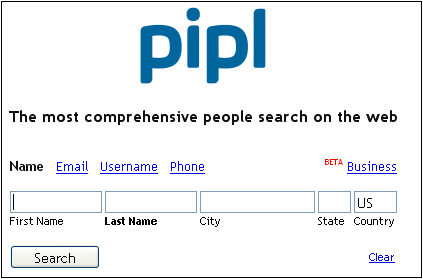
Locate Their Location By Email They Send You
To follow these steps you’ll need a Gmail account but if you followed the first recommendation that shouldn’t be a problem!
Once I had a woman I was dating tell me she was leaving town for Texas for a few weeks and I was 99% sure she was lying to me. I used these steps to discover that, indeed, she was still in town….spending her time with someone other than me! These steps can be used when you suspect someone is lying to you about where they are located. This can be used with both 419 scams and the married man scam (since the married men are likely to claim a different location when creating their account).
Please note that the results of this process are not an exact science and you can mess up if you use the wrong number. Also, this will display where the person’s internet service provider is, not their address. For example, when I search myself using this process I’m shown an address about 10 miles away from my house. If I received my internet over satellite or if I sent emails using my phone on a 3G network, the IP address could show me in any number of places that I don’t actually live in. Basically, use this process to help you research any suspicions you may have but don’t start making accusations just because things don’t look perfect when you use it. Hopefully this process will help you verify that they are telling the truth anyway!
- Browse to your Gmail account and open an email from the person you are suspicious of.
- On the far right there should be a down arrow. Click this and select “Show Original”.
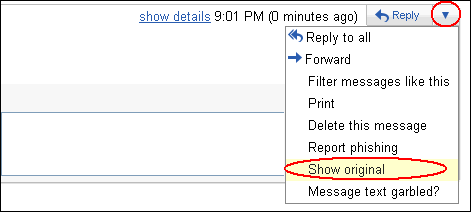
- This will display the full header text of the email. In this text, look for the last instance of “Received: from”. Next to this will be an IP address, a number separated by periods. Write down this number. In the example below our number is 24.131.241.24. Keep in mind there may be several “Received: from” sections and you want to select the last one (I’ve removed most of the text from my example below to save space, yours will contain much more information). Be aware that if you select the wrong numbers, you’ll get the wrong location. If you are unsure if you are selecting the correct number you may want to test this process by sending yourself an email from a different account.

- Browse to whatismyip.com and enter the IP address in the IP box. So in this case I would enter 24.131.241.24. The results would then show where that IP address is located. In this case, it shows Pittsburgh which is correct!
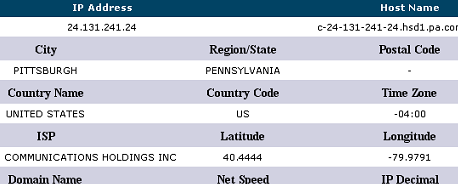
Get a Background Check Run on Them
I really do think this type of activity is excessive but there is one case where I could see it being used. If you’re about to make some huge commitment, like buying plane tickets to visit them or give them a large sum of money (please don’t do this!) then running a background check first could actually save you a lot of money and heartache. Aside from being the ultimate in offensiveness if things actually worked out between the two of you, background checks cost money. Still, if you’re spending $20 (or whatever it is) and end up saving $700 it would be worth it. Intelius is a popular choice for background checks and they have contacted me a few times in the past when I’ve discussed online dating safety. My original thoughts on background checks can be seen after they had first contacted me in the article Ideas for Safer Online Dating.
As long as people are using online dating, there will be other people looking to take advantage of them. Knowledge of these scams will help you protect yourself but the bad guys are always looking for new ways to trick people. If you feel like something strange is going on but it doesn’t fall into a scam category listed here, I would recommend the following:
- Listen to your gut! If something feels wrong, it probably is. I would recommend ending any relationship where you don’t feel safe or you feel like you’re being lied to. There are many, many people using online dating services and your time would be better spent talking to someone you can trust.
- If you’re not ready to end a relationship just because things don’t feel right at the very least take things extremely slow. Exercise extra caution and patience. Time may reveal why your gut was telling you something wasn’t right.
Learn More About Online Dating Scams and How to Better Protect Yourself
- Online Dating Scams: The Romance Scam is a discussion of the primary scam occurring on online dating sites today.
- Online Dating Scams: Additional Scams is a discussion of other less popular (but still very real) scams.
- Safer Online Dating Alliance is a grassroots initiative to raise public awareness, garner community support, and implement legislation to better protect those who participate in online dating services.
- 419 Eater is a community site that dedicates itself to making the scammers lives as difficult as possible. There are some great stories here that describe the great lengths they are able to get the scammers to go through without ever giving them a dime.
- Advance-fee fraud is discussed in great detail at Wikipedia. This article covers both the Romance Scan and 419 Scam as well as many others.
Posted in:

